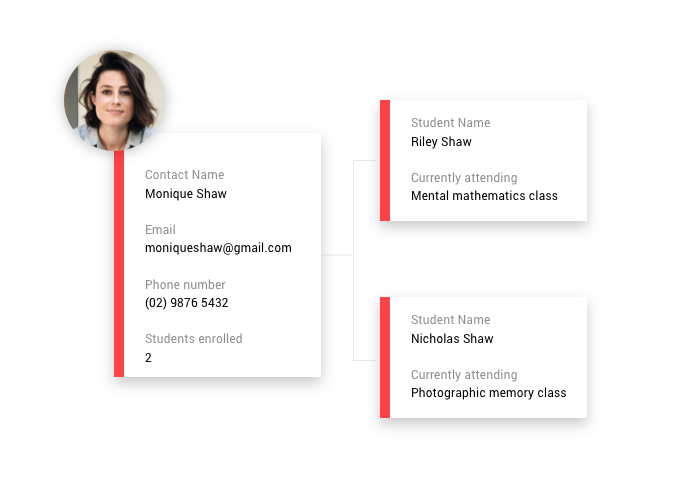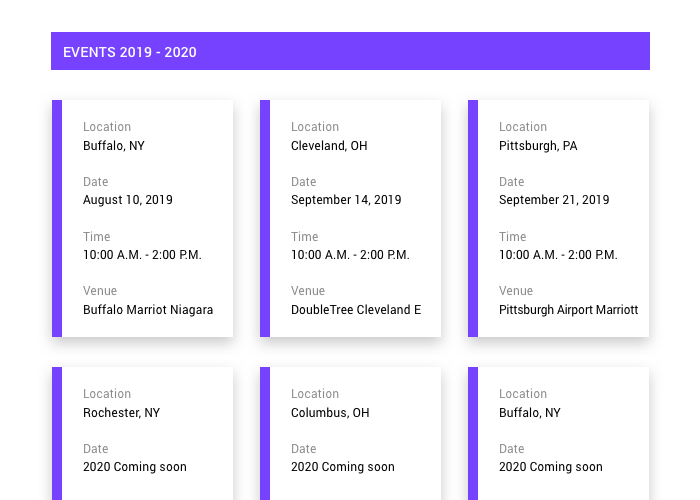Maintaining strong relationships with your customers is essential for sustaining a successful business. In order to understand and form relationships with your clients, however, you’ll need to keep organized.
For example, a property management company needs to store information about each of its buildings, landlords and tenants. A veterinarian might need to treat multiple pets belonging to one person, and a contractor might do kitchen and bath remodels for multiple clients and need to keep track of project information for each.
Custom objects would allow all these businesses to organize and manage their information in relational ways. They are a type of record in a CRM, similar to a contact record, that can be connected to multiple other records.
In the case of the contractor, he or she can create a custom object for each remodel project, allowing him to correspond the remodel with that homeowner’s record. If he’s remodeling both the kitchen and bathroom inside the same home, he’d have two records tied to the homeowner’s record. The remodel project records could include information such as the estimated cost, material selections and timeline, while the homeowner’s record would include their name, address and other relevant data.
This kind of linking allows businesses to better keep track of information and ensure they’re accurately serving their customers. The veterinarian wouldn’t want to accidentally send an email to the pet instead of the human, just as a property manager wouldn’t want to send tenants in their New York building information about a renovation taking place in their Chicago building.
Ontraport clients use custom objects in many creative ways to manage these types of complex relationships. Here we profile just a few successful examples: An early-development learning center that manages their courses, students and parents; a motherhood education company that organizes many events in numerous cities; and we’ll even share how the Ontraport team uses custom objects to streamline its expert certification process.
Shichida Australia
To say the students of Shichida Australia get an early start is an understatement — babies as young as five months old attend these weekly classes accompanied by their parents.
Invented in Japan more than 50 years ago by Professor Makoto Shichida, the Shichida education program uses learning methods such as music, lyrics and cue cards to build kids’ memories and stimulate their brain development.
Owner Shiao-Ling Lim opened her first location in Australia in 2008 to bring the philosophy overseas so babies outside of Asia could benefit from it. Today, Shichida Australia has five early learning centers, more than 2,000 students and 50 employees.
Using Custom Objects
With so many students — and their parents — to keep track of across a variety of courses and multiple locations, the Shichida team knew they needed more than a basic one-to-one CRM setup.

They started using Ontraport in 2016 and worked with Ontraport Expert Andrew Wadsworth to create a custom objects system to organize and manage each of these players and automate their interactions.
“We understood that in order to scale, we needed tools to help us automate,” said Shiao-Ling.
They created three object types: Students, Parents and Inquiries (representing interest in courses). Using one-to-many relationships, they tied these together in various ways. For example, one parent may have multiple children, each of whom attends several courses.
The creation of object records occurs automatically when leads enter their information in a form on Shichida’s home page. Just as the values entered into any form field automatically get entered into a contact record inside of Ontraport, so do they with object records.
The form requests the parent’s name and child’s name, and it includes a space for leads to enter their inquiry, among other form fields. The data entered into each of those fields syncs with their relative Parent, Student and Inquiry object records. If records don’t yet exist, submitting the form creates a new record.
The ability to organize all of this information seamlessly and automatically has allowed Shiao-Ling to regain her time; she says she’s “freed to focus on strategies and guiding the team.” Since the beginning of her journey with Ontraport, and since implementing these custom objects two years ago, Shichida Australia has doubled in size.
Motherhood Matters
When you’re expecting, there’s a lot to expect — and baby books and blogs can only cover so much. After experiencing the surprises that come with being a new mother, Monica Infante was inspired to launch Motherhood Matters, a one-stop shop for new parents and their babies.
Motherhood Matters produces conference-style events for new and soon-to-be parents as well as for parents of kids ages 2-5. What began as a small event in Rochester, New York quickly blossomed into a multi-city movement to both educate and empower parents.
As word spread and Infante continued to expand events to several locations within the New York, Pennsylvania and Ohio metro areas, she realized her manual workflow was weighing her business down. “Running leaner became imperative,” she said.
After spending several years working with separate tools for each type of task within the business, Monica transitioned to Ontraport in 2017 to bring everything into one centralized system.
“We needed the ability to see, search, and report on information which, to that point, had been siloed in a variety of disparate solutions,” she said, adding that they also “needed as much automation as we could get.”
Using Custom Objects
Monica and her team use custom objects in Ontraport to manage their seven events, the attendees and the contracts related to the exhibitors and speakers at each event.

Specifically, they organize this information with three vital custom objects:
- Events objects hold the particulars for each event location and date.
- Agreements objects store information on exhibitors and speakers for each event.
- Items objects include any product or literature that needs to be inventoried, such as an exhibitor’s giveaways or a speaker’s presentation slides.
The object records cross each others’ paths and interplay in numerous ways to enable Motherhood Matters to efficiently and automatically manage all the moving pieces involved in event planning. There are also numerous campaigns under each object to automate the relevant follow-up communication and tasks.
“Our decision tree and conditional logic are incredibly complex, with each outcome resulting in a totally new path,” Monica said. “I don’t have to keep that in my head anymore. Instead of moving people around, I tick a box and the system does everything it’s supposed to.”
For example, some of the most helpful campaigns for Monica and the team have been those designed to remind vendors about specific elements she needed prior to the event. Vendors are added to one or more appropriate campaigns when they pay for an exhibitor package, depending on which options they select at checkout. These campaigns look for data fields in the Agreements object to be updated. If the fields remain blank, the exhibitor receives a series of emails reminding them to submit their information, allowing Monica to fulfill her obligations.
“No other tool allowed us to effectively automate what we do from a customer service standpoint,” Monica said. “Ontraport’s flexibility allows us to keep the personalized touches in our relationship nurturing process in place.”
Monica worked with Ontraport Expert Neil Kristianson to build these custom objects and related campaigns. She said using the automation and CRM functionality of Ontraport has significantly minimized the amount of time her team spends on tasks, allowing them to focus on actually running and promoting their events.
“Ontraport has fueled our growth in so many ways … its comprehensiveness magnifies our capacity to add additional events,” Monica said. “By centralizing the management of so many aspects of the business in one place, Ontraport empowers us to operate as leanly as possible.”
Ontraport Experts
At Ontraport, we use custom objects to manage our Ontraport Experts program. These experts are critical resources for our users across the world, and to become certified, they must take a five-day advanced software course and pass an exam. To remain certified, experts are required to pass exams every year to show they’re staying on top of the system’s features.
Managing all of the factors involved with these courses, exams and renewals became time-consuming, and the data we needed to manage the program quickly outgrew our method of organizing which relied solely on fields and tags within each expert’s contact record.
“There were a lot of moving parts,” Ontraport PR Manager Stephanie Cuevas said. “Which course are they attending — the one in California or Australia? Is this a renewal or new certification? Have they paid for the renewal? Were the tests graded? Did they pass?”
One of the biggest challenges was ensuring fields for renewal dates, payments and test scores didn’t overwrite themselves each renewal period. It became messy trying to figure out which original certification class each expert was in and when they had last renewed. The manual grading of the exams was also taking an employee 15-20 hours a quarter.
“We needed a way to streamline this process in an organized fashion, and custom objects was the answer,” Stephanie said.
Using Custom Objects
We created a custom object to house the certification tests, and those objects (tests) are related to the contact record for the expert who took the test. This allows multiple tests to be related to one expert, as experts take a new test every year to maintain their certification status.

The test is simply a form so, when it’s filled out, the related fields update inside the test object record. Tests from every year are held in separate tabs so answers aren’t overwritten; this also accommodates for the annual changes in test questions.
An automated campaign relates the test objects and the experts’ contact records: Once a test is submitted, the test is automatically scored using “if answer A = A, add 1 point” logic, and a task is sent to a team member to manually review the practical portion. From there, the grade goes into the test object record and spurs an automated follow-up series depending on whether the expert passed or failed.
For example, experts who pass receive emails congratulating them, informing them of their benefits and prompting them to log in to the Certified Experts portal for resources. Meanwhile, the renewal date in their contact record is updated to the following year, and that date becomes the reference source for an automated series of renewal reminders when that period comes around.
“Using custom objects for our certification exams really allowed us to maintain clean contact records while still using only one system to automate all of our courses and grading,” Stephanie said, adding that the time spent grading exams was reduced by over 50%.
This concept can be applied to any business that requires renewals, such as a membership product that involves completing a course or updating their information every year in order to maintain membership status.
“Gone are the days of Google forms, missing information, overwritten fields and tedious grading,” Stephanie said. “Now I only have one task sent to me, and Ontraport takes on the rest.”
